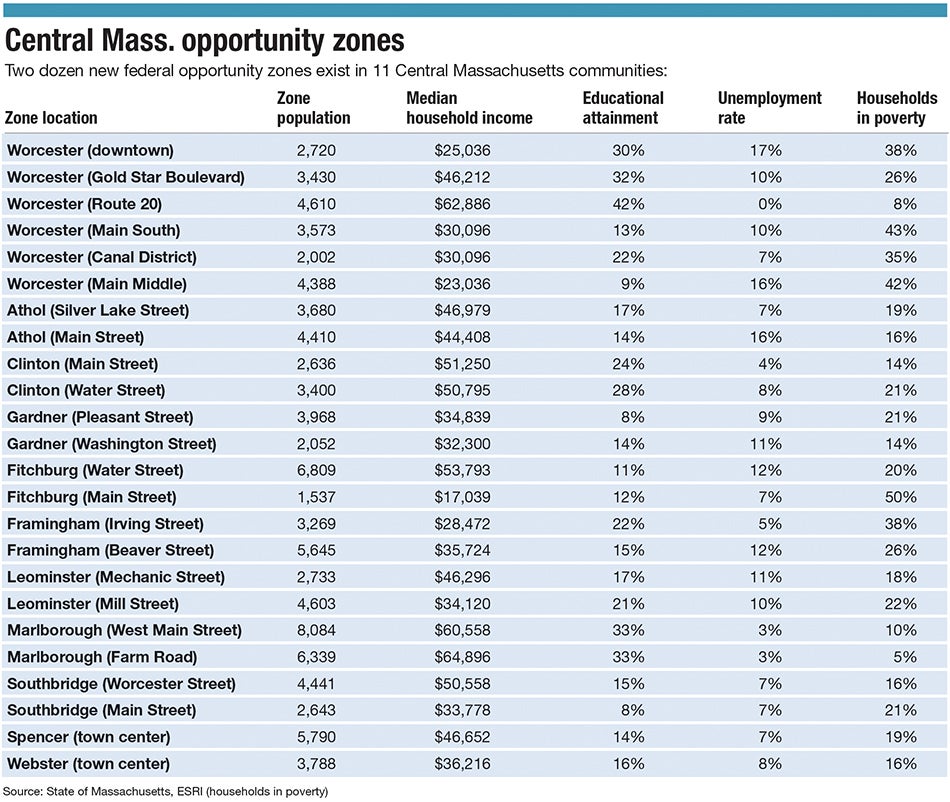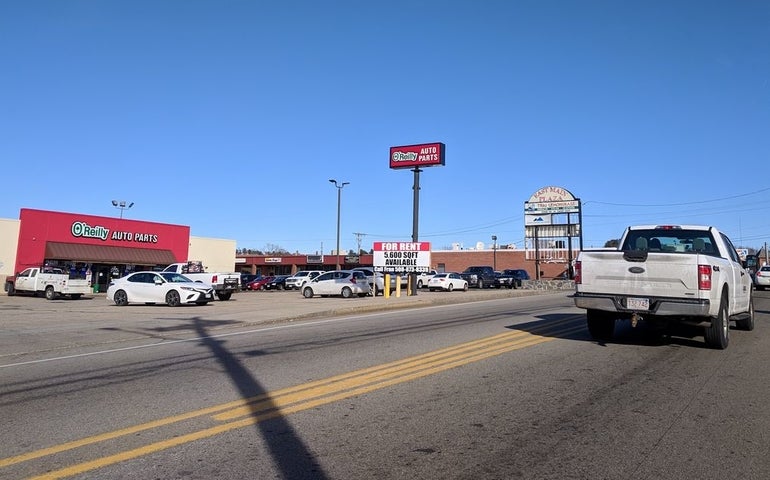For neighborhoods in Central Massachusetts overlooked by developers for years, there’s a potential salvation: a new federal tax incentive program meant to steer investment toward areas not otherwise receiving it.
These so-called opportunity zones have been designated in areas of Worcester, Fitchburg, Framingham, Gardner, Leominster and Marlborough. Smaller pockets exist, too, in the towns of Athol, Clinton, Spencer, Southbridge and Webster.
These areas – each its own Census tract – are largely lower-income, with worse educational attainment and unemployment rates. The idea of the new program is to send investment to areas not normally on the radar for such financing.
Municipal leaders where opportunity zones are located in Central Massachusetts say there’s still much unknown about the program. They’re working to find out more, while not waiting to let investors or developers know they’re open to working with them on new projects.
“From my perspective,” said Doug Willardson, the Webster town administrator, “it’s such a new program that a lot of developers don’t really know what it is.”
Still, the town is working on a market analysis for Webster center and looking to conduct engineering studies on certain higher-potential parcels. Willardson has been pitching the opportunity zone in the town center to developers or anyone who might have capital gains they’re looking to write off.
“We say, ‘You can do that and help the town at the same time,’” he said.
Creating new opportunities
Fitchburg officials are working to make it clear to developers where its two opportunity zones are located and what parcels might be ripe for new investment. The zones – where one in five Fitchburg residents live – cover downtown and its Water and South street corridors.
Tom Skwierawski, Fitchburg’s executive director of planning and commercial development, recommended those Census tracts in consideration of development potential and geographic distribution.
“South Street has always been one of our stronger corridors,” Skwierawski said of the larger of Fitchburg’s two zones.
The opportunity zones in Central Massachusetts include nearly 100,000 people and their average poverty rate is 23 percent. The median household income is $41,085, compared to the state median of $71,167.

The Baker Administration approved the zones last April, and the U.S. Treasury certified them a month later.
Little has happened since.
Jim Umphrey, a principal with the Worcester real estate firm Kelleher & Sadowsky, said the market has yet to meaningfully respond to the program because many are still trying to figure out how it works. In fact, a Worcester Regional Chamber of Commerce event about the opportunity zone program earlier this month drew a packed ballroom at Mechanics Hall, with many questions about the basics of the program.
Even when such projects are underway, municipal leaders – or the public – won’t necessarily know they’re funded through the program because there are no reporting requirements.
Worcester has six opportunity zones, including downtown and Main South.
Worcester City Hall has received inquiries on each opportunity zone, but officials don’t expect development to take place anytime too soon, said Peter Dunn, Worcester’s business and community development coordinator.
“There are unanswered questions,” Dunn said.
Fitchburg officials are working to be ready for whenever investment comes the city’s way, whether it is through the opportunity zones or not. City officials are among those striving to find out more about the program.
“You can imagine the kinds of training sessions going on with opportunity zones,” said Mary Jo Bohart, Fitchburg’s director of economic development. “They’re going on constantly.”
Still awaiting results
The 2017 federal law creating the opportunity zone program is meant to create incentives for investors to pour money into neglected neighborhoods by allowing for deferral of capital gains taxes.
Few at this point seem to expect major development in Central Massachusetts to result from the program.
“I don’t see major equity funds like Goldman Sachs coming in and putting money here in Worcester,” Umphrey said.
The capital gains benefits won’t make projects in opportunity zones economically viable if they wouldn’t have been otherwise, said Karen Kelleher, the executive director of the Boston offices of the community investment group Local Initiatives Support Corporation.
“This is more like the icing on the cake of an investment that has your equity at risk,” Kelleher said.
But for officials in places like Clinton, Spencer or Webster, which haven’t seen investment in new development like larger communities or those closer to Boston have, the new federal program is a chance for new development officials don’t want to pass up.
Four in 10 Clinton residents live in one of the town’s two opportunity zones. Philip Duffy, Clinton’s community and economic development director, said he’s expecting the program might appeal most to those looking to build housing, where a return on investment might be longer, allowing for a larger capital gains reduction.
Duffy worries large-scale investment will still find its way to places in or directly outside Boston, where there’s a higher upside than in towns like Clinton, with any project likely to be far smaller in scale.
“Opportunity zone funding is not likely to make a project happen if it wasn’t already going to happen,” Duffy said. “It is a question of what kind of investment we’ll see.”

